Business Law Assignment: Contractual Issues
VerifiedAdded on 2021/04/17
|7
|1240
|44
AI Summary
The assignment discusses various contractual issues in business law, including part consideration, past consideration, rejection of offer, and breach of agreement. It examines case studies such as Hyde v Wrench, Roscorla v Thomas, Stilk v Myrick, and Waltons Stores (Interstate) Ltd v Maher to illustrate these concepts.
Contribute Materials
Your contribution can guide someone’s learning journey. Share your
documents today.
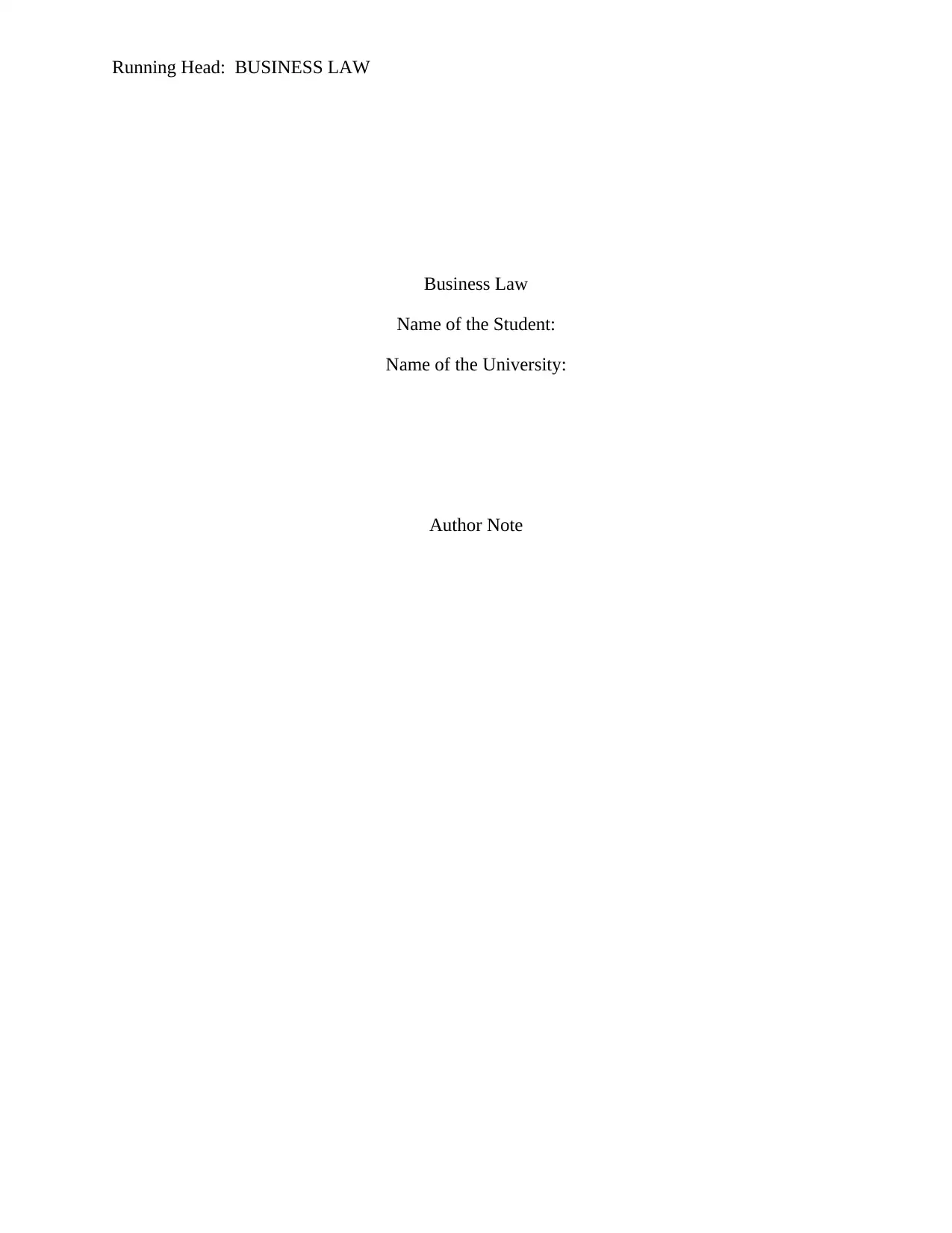
Running Head: BUSINESS LAW
Business Law
Name of the Student:
Name of the University:
Author Note
Business Law
Name of the Student:
Name of the University:
Author Note
Secure Best Marks with AI Grader
Need help grading? Try our AI Grader for instant feedback on your assignments.
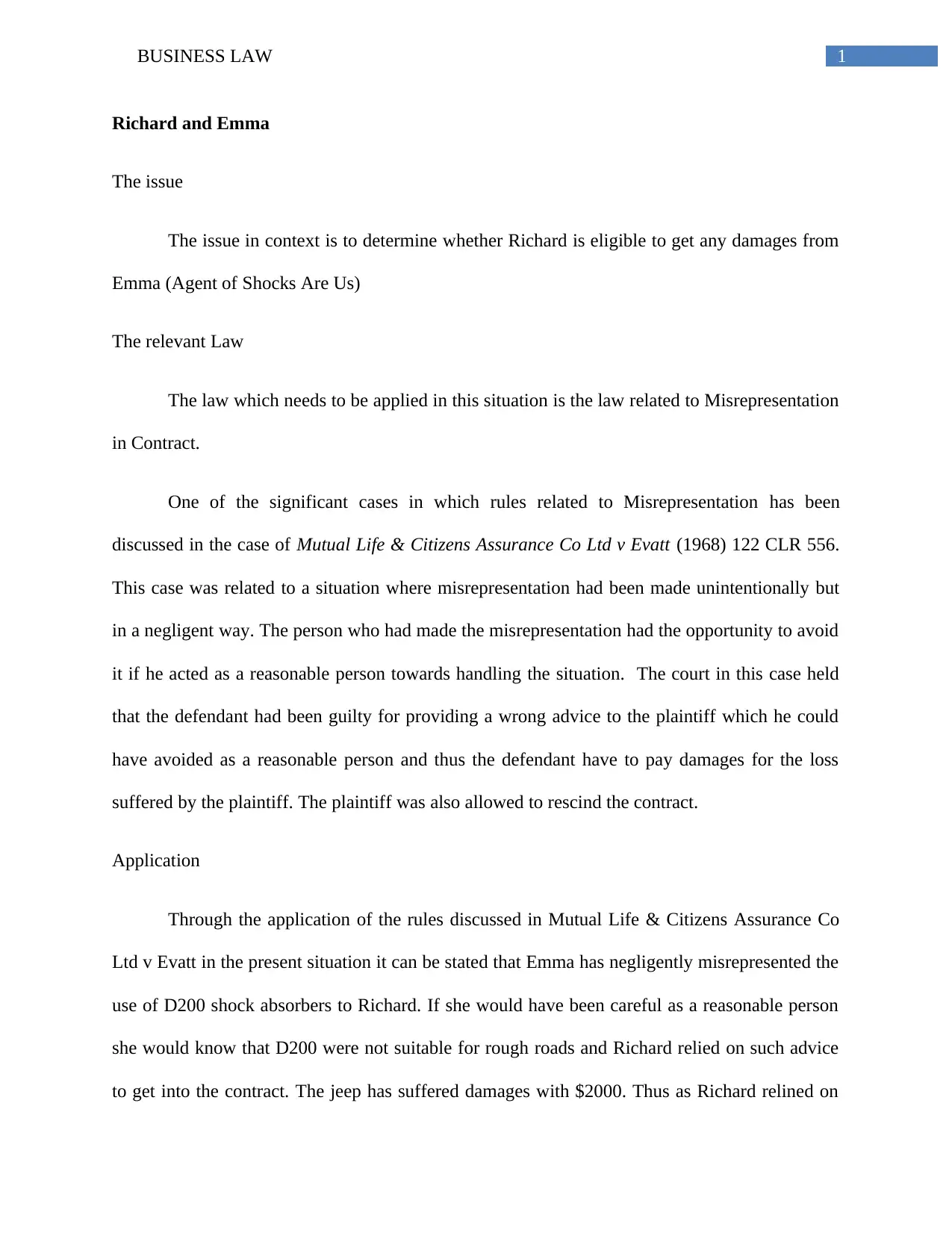
1BUSINESS LAW
Richard and Emma
The issue
The issue in context is to determine whether Richard is eligible to get any damages from
Emma (Agent of Shocks Are Us)
The relevant Law
The law which needs to be applied in this situation is the law related to Misrepresentation
in Contract.
One of the significant cases in which rules related to Misrepresentation has been
discussed in the case of Mutual Life & Citizens Assurance Co Ltd v Evatt (1968) 122 CLR 556.
This case was related to a situation where misrepresentation had been made unintentionally but
in a negligent way. The person who had made the misrepresentation had the opportunity to avoid
it if he acted as a reasonable person towards handling the situation. The court in this case held
that the defendant had been guilty for providing a wrong advice to the plaintiff which he could
have avoided as a reasonable person and thus the defendant have to pay damages for the loss
suffered by the plaintiff. The plaintiff was also allowed to rescind the contract.
Application
Through the application of the rules discussed in Mutual Life & Citizens Assurance Co
Ltd v Evatt in the present situation it can be stated that Emma has negligently misrepresented the
use of D200 shock absorbers to Richard. If she would have been careful as a reasonable person
she would know that D200 were not suitable for rough roads and Richard relied on such advice
to get into the contract. The jeep has suffered damages with $2000. Thus as Richard relined on
Richard and Emma
The issue
The issue in context is to determine whether Richard is eligible to get any damages from
Emma (Agent of Shocks Are Us)
The relevant Law
The law which needs to be applied in this situation is the law related to Misrepresentation
in Contract.
One of the significant cases in which rules related to Misrepresentation has been
discussed in the case of Mutual Life & Citizens Assurance Co Ltd v Evatt (1968) 122 CLR 556.
This case was related to a situation where misrepresentation had been made unintentionally but
in a negligent way. The person who had made the misrepresentation had the opportunity to avoid
it if he acted as a reasonable person towards handling the situation. The court in this case held
that the defendant had been guilty for providing a wrong advice to the plaintiff which he could
have avoided as a reasonable person and thus the defendant have to pay damages for the loss
suffered by the plaintiff. The plaintiff was also allowed to rescind the contract.
Application
Through the application of the rules discussed in Mutual Life & Citizens Assurance Co
Ltd v Evatt in the present situation it can be stated that Emma has negligently misrepresented the
use of D200 shock absorbers to Richard. If she would have been careful as a reasonable person
she would know that D200 were not suitable for rough roads and Richard relied on such advice
to get into the contract. The jeep has suffered damages with $2000. Thus as Richard relined on
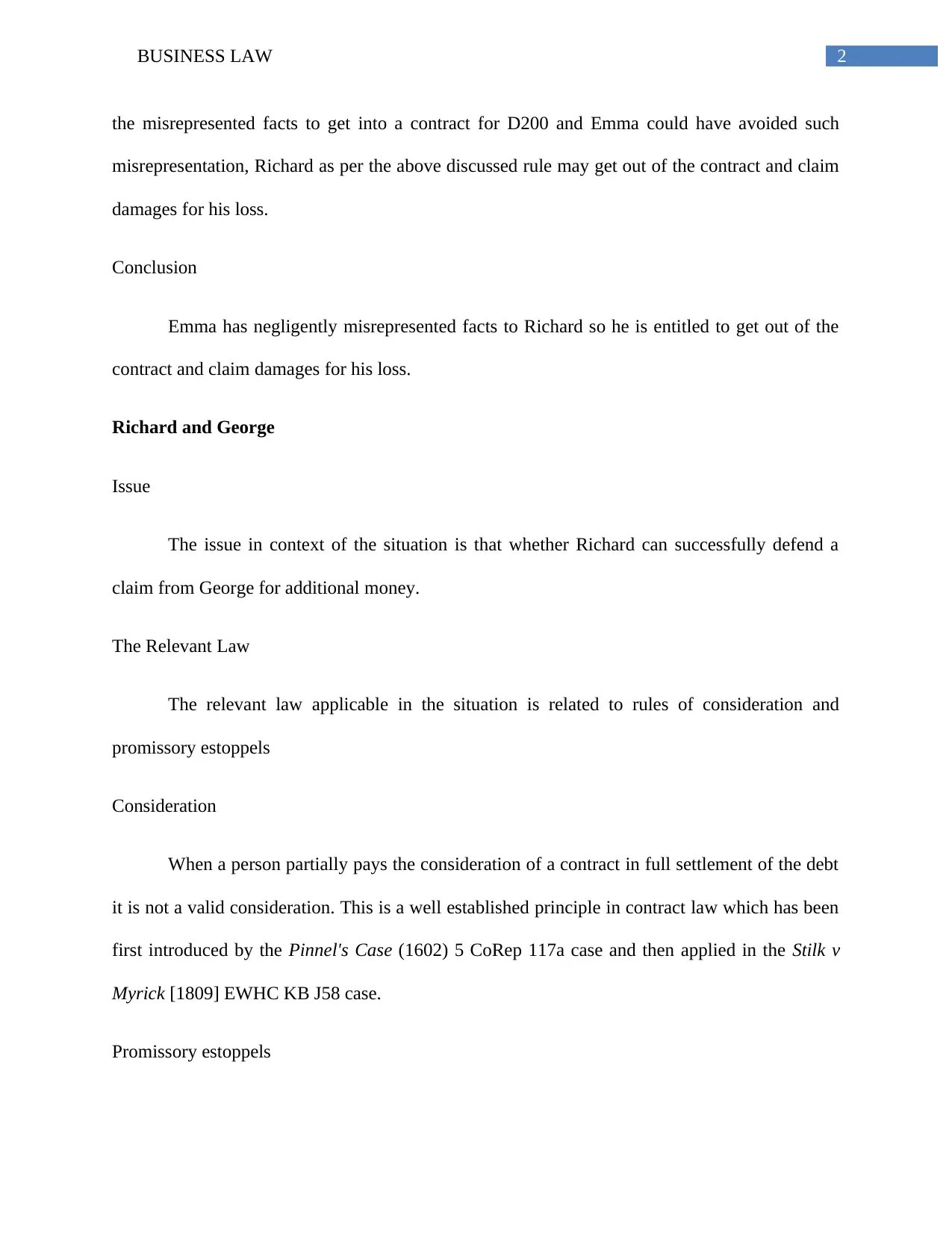
2BUSINESS LAW
the misrepresented facts to get into a contract for D200 and Emma could have avoided such
misrepresentation, Richard as per the above discussed rule may get out of the contract and claim
damages for his loss.
Conclusion
Emma has negligently misrepresented facts to Richard so he is entitled to get out of the
contract and claim damages for his loss.
Richard and George
Issue
The issue in context of the situation is that whether Richard can successfully defend a
claim from George for additional money.
The Relevant Law
The relevant law applicable in the situation is related to rules of consideration and
promissory estoppels
Consideration
When a person partially pays the consideration of a contract in full settlement of the debt
it is not a valid consideration. This is a well established principle in contract law which has been
first introduced by the Pinnel's Case (1602) 5 CoRep 117a case and then applied in the Stilk v
Myrick [1809] EWHC KB J58 case.
Promissory estoppels
the misrepresented facts to get into a contract for D200 and Emma could have avoided such
misrepresentation, Richard as per the above discussed rule may get out of the contract and claim
damages for his loss.
Conclusion
Emma has negligently misrepresented facts to Richard so he is entitled to get out of the
contract and claim damages for his loss.
Richard and George
Issue
The issue in context of the situation is that whether Richard can successfully defend a
claim from George for additional money.
The Relevant Law
The relevant law applicable in the situation is related to rules of consideration and
promissory estoppels
Consideration
When a person partially pays the consideration of a contract in full settlement of the debt
it is not a valid consideration. This is a well established principle in contract law which has been
first introduced by the Pinnel's Case (1602) 5 CoRep 117a case and then applied in the Stilk v
Myrick [1809] EWHC KB J58 case.
Promissory estoppels
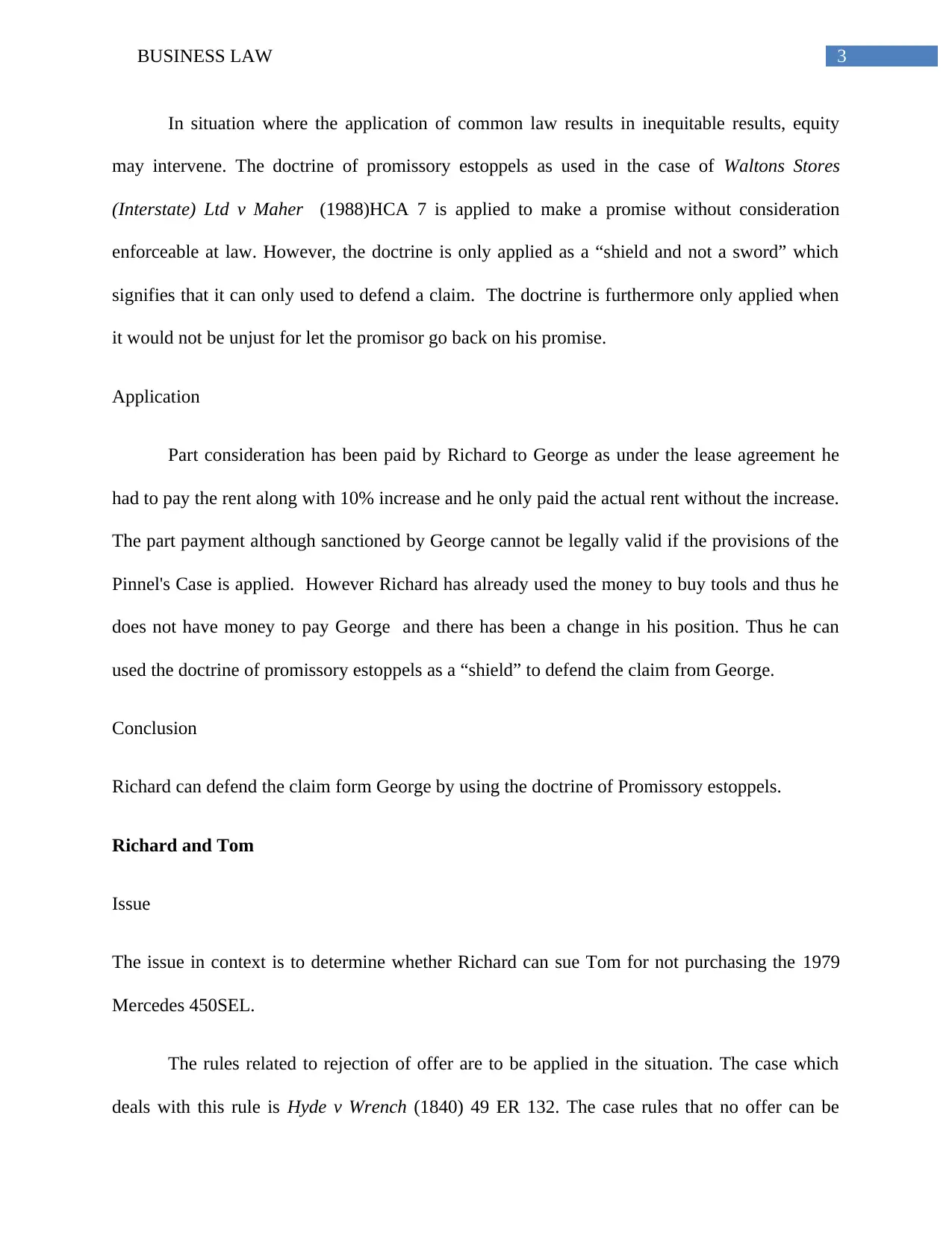
3BUSINESS LAW
In situation where the application of common law results in inequitable results, equity
may intervene. The doctrine of promissory estoppels as used in the case of Waltons Stores
(Interstate) Ltd v Maher (1988)HCA 7 is applied to make a promise without consideration
enforceable at law. However, the doctrine is only applied as a “shield and not a sword” which
signifies that it can only used to defend a claim. The doctrine is furthermore only applied when
it would not be unjust for let the promisor go back on his promise.
Application
Part consideration has been paid by Richard to George as under the lease agreement he
had to pay the rent along with 10% increase and he only paid the actual rent without the increase.
The part payment although sanctioned by George cannot be legally valid if the provisions of the
Pinnel's Case is applied. However Richard has already used the money to buy tools and thus he
does not have money to pay George and there has been a change in his position. Thus he can
used the doctrine of promissory estoppels as a “shield” to defend the claim from George.
Conclusion
Richard can defend the claim form George by using the doctrine of Promissory estoppels.
Richard and Tom
Issue
The issue in context is to determine whether Richard can sue Tom for not purchasing the 1979
Mercedes 450SEL.
The rules related to rejection of offer are to be applied in the situation. The case which
deals with this rule is Hyde v Wrench (1840) 49 ER 132. The case rules that no offer can be
In situation where the application of common law results in inequitable results, equity
may intervene. The doctrine of promissory estoppels as used in the case of Waltons Stores
(Interstate) Ltd v Maher (1988)HCA 7 is applied to make a promise without consideration
enforceable at law. However, the doctrine is only applied as a “shield and not a sword” which
signifies that it can only used to defend a claim. The doctrine is furthermore only applied when
it would not be unjust for let the promisor go back on his promise.
Application
Part consideration has been paid by Richard to George as under the lease agreement he
had to pay the rent along with 10% increase and he only paid the actual rent without the increase.
The part payment although sanctioned by George cannot be legally valid if the provisions of the
Pinnel's Case is applied. However Richard has already used the money to buy tools and thus he
does not have money to pay George and there has been a change in his position. Thus he can
used the doctrine of promissory estoppels as a “shield” to defend the claim from George.
Conclusion
Richard can defend the claim form George by using the doctrine of Promissory estoppels.
Richard and Tom
Issue
The issue in context is to determine whether Richard can sue Tom for not purchasing the 1979
Mercedes 450SEL.
The rules related to rejection of offer are to be applied in the situation. The case which
deals with this rule is Hyde v Wrench (1840) 49 ER 132. The case rules that no offer can be
Secure Best Marks with AI Grader
Need help grading? Try our AI Grader for instant feedback on your assignments.
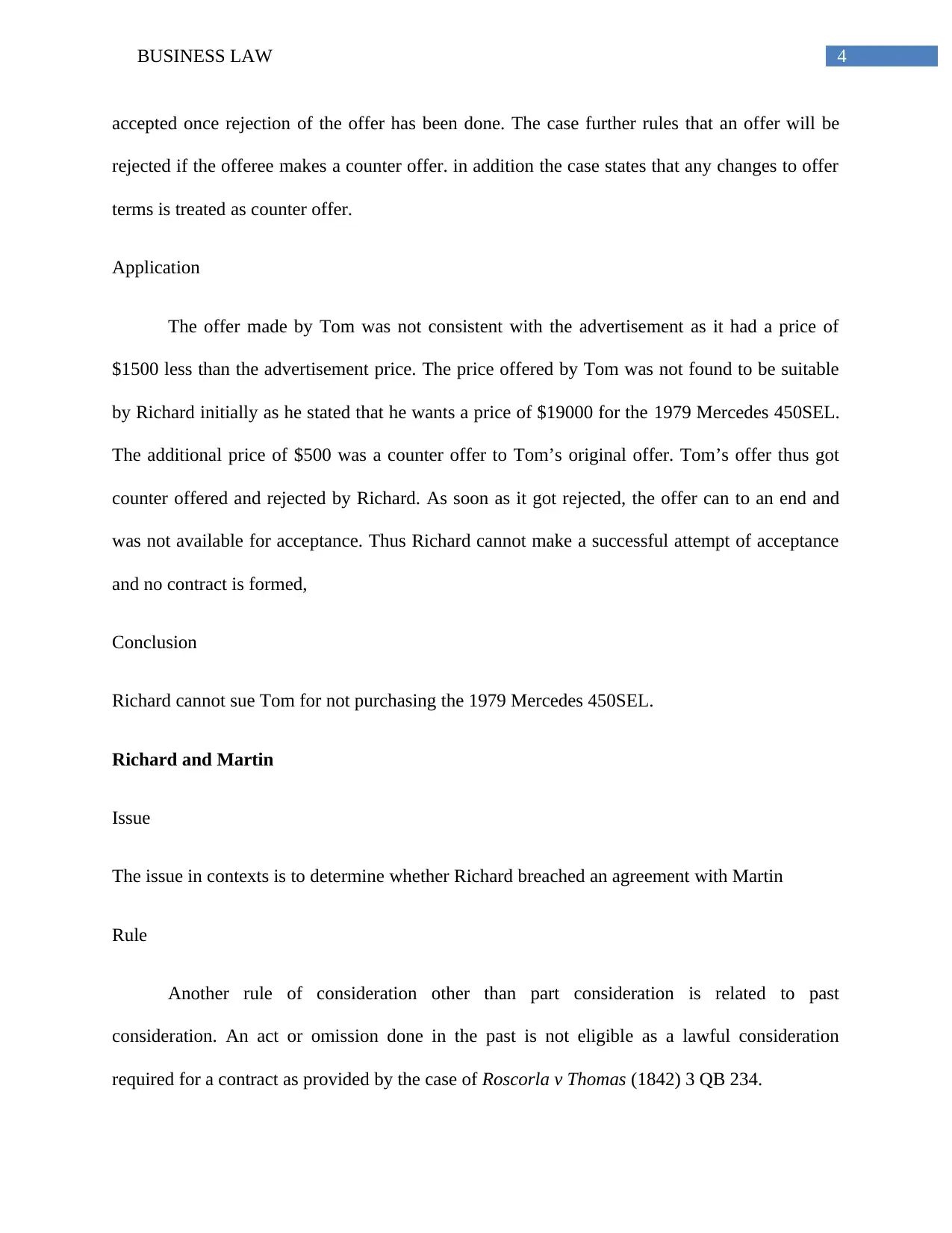
4BUSINESS LAW
accepted once rejection of the offer has been done. The case further rules that an offer will be
rejected if the offeree makes a counter offer. in addition the case states that any changes to offer
terms is treated as counter offer.
Application
The offer made by Tom was not consistent with the advertisement as it had a price of
$1500 less than the advertisement price. The price offered by Tom was not found to be suitable
by Richard initially as he stated that he wants a price of $19000 for the 1979 Mercedes 450SEL.
The additional price of $500 was a counter offer to Tom’s original offer. Tom’s offer thus got
counter offered and rejected by Richard. As soon as it got rejected, the offer can to an end and
was not available for acceptance. Thus Richard cannot make a successful attempt of acceptance
and no contract is formed,
Conclusion
Richard cannot sue Tom for not purchasing the 1979 Mercedes 450SEL.
Richard and Martin
Issue
The issue in contexts is to determine whether Richard breached an agreement with Martin
Rule
Another rule of consideration other than part consideration is related to past
consideration. An act or omission done in the past is not eligible as a lawful consideration
required for a contract as provided by the case of Roscorla v Thomas (1842) 3 QB 234.
accepted once rejection of the offer has been done. The case further rules that an offer will be
rejected if the offeree makes a counter offer. in addition the case states that any changes to offer
terms is treated as counter offer.
Application
The offer made by Tom was not consistent with the advertisement as it had a price of
$1500 less than the advertisement price. The price offered by Tom was not found to be suitable
by Richard initially as he stated that he wants a price of $19000 for the 1979 Mercedes 450SEL.
The additional price of $500 was a counter offer to Tom’s original offer. Tom’s offer thus got
counter offered and rejected by Richard. As soon as it got rejected, the offer can to an end and
was not available for acceptance. Thus Richard cannot make a successful attempt of acceptance
and no contract is formed,
Conclusion
Richard cannot sue Tom for not purchasing the 1979 Mercedes 450SEL.
Richard and Martin
Issue
The issue in contexts is to determine whether Richard breached an agreement with Martin
Rule
Another rule of consideration other than part consideration is related to past
consideration. An act or omission done in the past is not eligible as a lawful consideration
required for a contract as provided by the case of Roscorla v Thomas (1842) 3 QB 234.
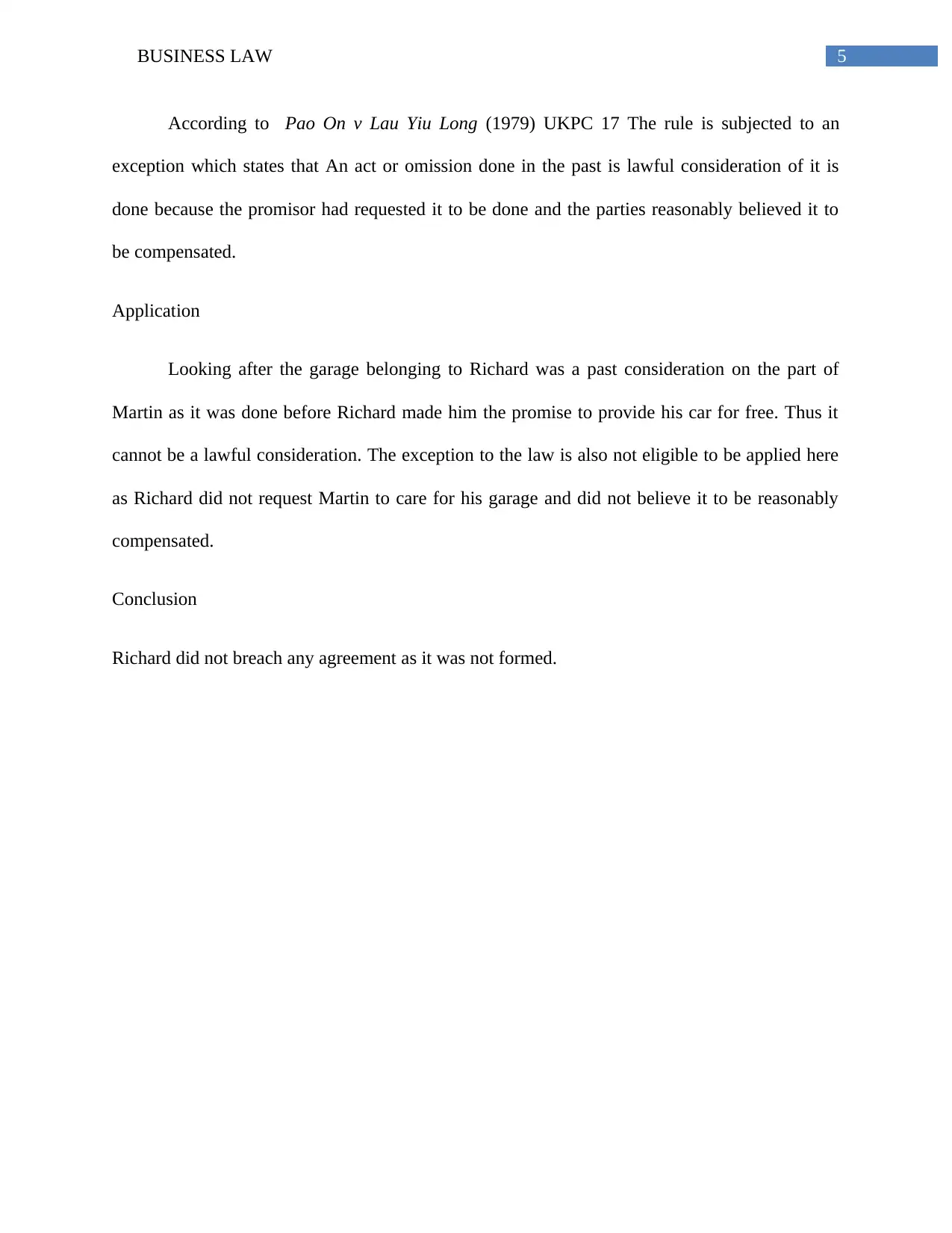
5BUSINESS LAW
According to Pao On v Lau Yiu Long (1979) UKPC 17 The rule is subjected to an
exception which states that An act or omission done in the past is lawful consideration of it is
done because the promisor had requested it to be done and the parties reasonably believed it to
be compensated.
Application
Looking after the garage belonging to Richard was a past consideration on the part of
Martin as it was done before Richard made him the promise to provide his car for free. Thus it
cannot be a lawful consideration. The exception to the law is also not eligible to be applied here
as Richard did not request Martin to care for his garage and did not believe it to be reasonably
compensated.
Conclusion
Richard did not breach any agreement as it was not formed.
According to Pao On v Lau Yiu Long (1979) UKPC 17 The rule is subjected to an
exception which states that An act or omission done in the past is lawful consideration of it is
done because the promisor had requested it to be done and the parties reasonably believed it to
be compensated.
Application
Looking after the garage belonging to Richard was a past consideration on the part of
Martin as it was done before Richard made him the promise to provide his car for free. Thus it
cannot be a lawful consideration. The exception to the law is also not eligible to be applied here
as Richard did not request Martin to care for his garage and did not believe it to be reasonably
compensated.
Conclusion
Richard did not breach any agreement as it was not formed.
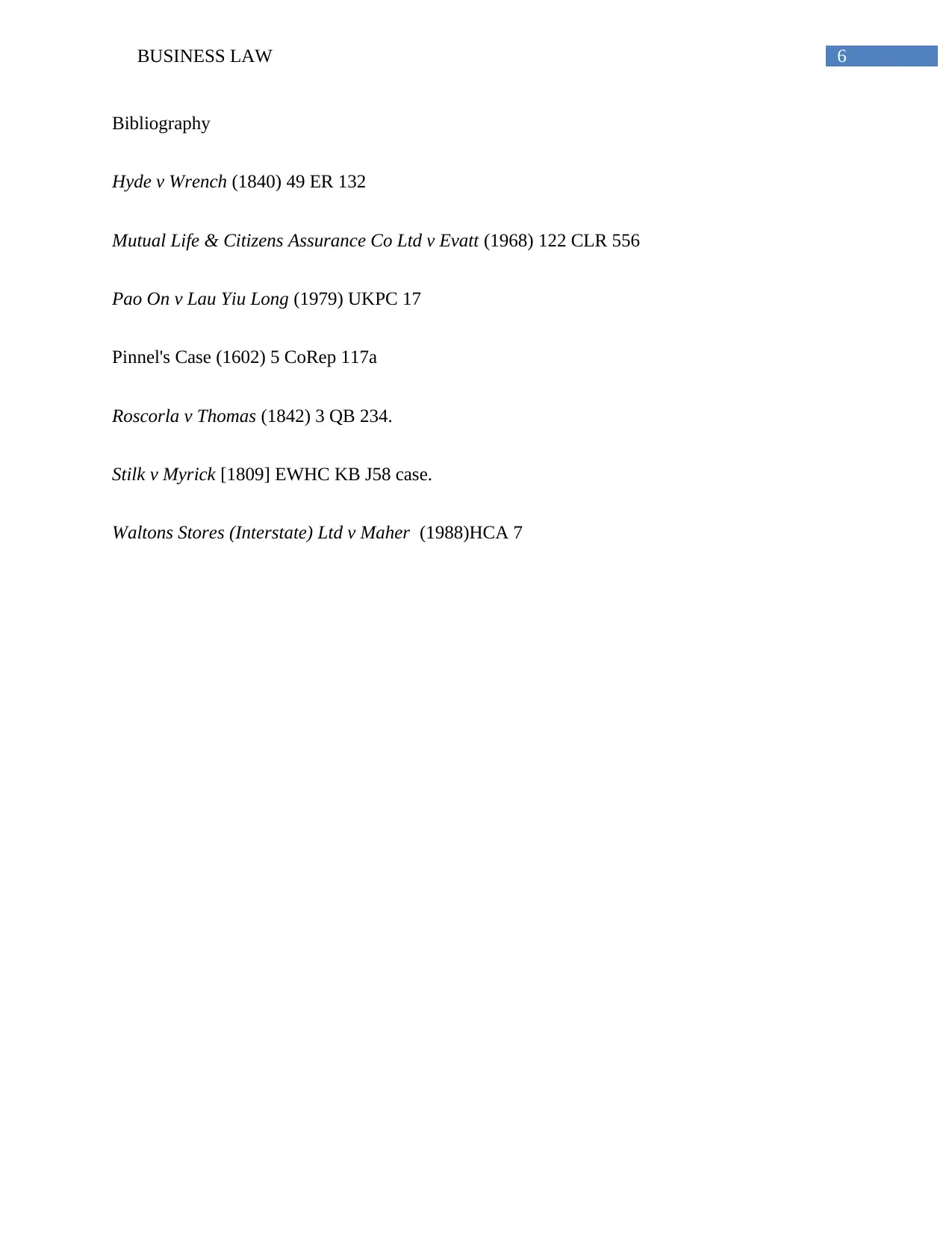
6BUSINESS LAW
Bibliography
Hyde v Wrench (1840) 49 ER 132
Mutual Life & Citizens Assurance Co Ltd v Evatt (1968) 122 CLR 556
Pao On v Lau Yiu Long (1979) UKPC 17
Pinnel's Case (1602) 5 CoRep 117a
Roscorla v Thomas (1842) 3 QB 234.
Stilk v Myrick [1809] EWHC KB J58 case.
Waltons Stores (Interstate) Ltd v Maher (1988)HCA 7
Bibliography
Hyde v Wrench (1840) 49 ER 132
Mutual Life & Citizens Assurance Co Ltd v Evatt (1968) 122 CLR 556
Pao On v Lau Yiu Long (1979) UKPC 17
Pinnel's Case (1602) 5 CoRep 117a
Roscorla v Thomas (1842) 3 QB 234.
Stilk v Myrick [1809] EWHC KB J58 case.
Waltons Stores (Interstate) Ltd v Maher (1988)HCA 7
1 out of 7
Related Documents
Your All-in-One AI-Powered Toolkit for Academic Success.
+13062052269
info@desklib.com
Available 24*7 on WhatsApp / Email
![[object Object]](/_next/static/media/star-bottom.7253800d.svg)
Unlock your academic potential
© 2024 | Zucol Services PVT LTD | All rights reserved.





